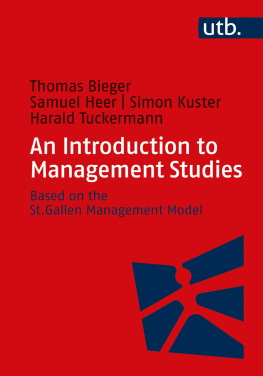Stafford Beer
Professor Stafford Beer, the founder of management cybernetics, is an international consultant in the management sciences.
He was a company commander in the Gurkhas at the end of World War II. Since then, he has held managerial positions at every levelincluding those of Production Controller, Director of Management Science, Director of Development, Managing Director, Company President, and Chairman of the Board, in various companies. He is currently Chairman of Syncho Ltd (UK) and Team Syntegrity Inc. (Canada). He has worked at the governmental level in twenty-two countries, and for many international agencies.
He is Visiting Professor at both Manchester (since 1969) and Durham Business Schools, UK. Earlier, he was the first Professor of General Systems at the Open University and, for many years, Adjunct Professor at the Wharton School in the University of Pennsylvania, USA. He is currently a Research Professor at University College of Swansea, UK, and an Adjunct Professor at the University of Toronto, Canada. Liverpool John Morres University, UK, has nominated him Honorary Professor of Organizational Transformation.
Currently President of the World Organization of Systems and Cybernetics, Professor Beer holds its Norbert Wiener Gold Medal, and is a Governor of the International Council for Computer Communication. He is a Past President of the Operational Research Society, and holds the Lanchester Prize of the American Operations Research Society. He is also a Past President of the International Society for Social Systems Sciences, and has the McCulloch Award of the American Society for Cybernetics, of which he is now a Trustee. Other awards include the Silver Medal of the Royal Swedish Academy for Engineering Sciences, an Honorary Doctorate from Concordia University in Montreal, and the Freedom of the City of London.
Author of over two hundred publications, including eleven books variously translated into thirteen languages, Stafford Beer is a published poet, and has held several exhibitions of paintings. He teaches meditative yoga, learned in India, to individual pupils
Hardback edition 1966, reprinted 1967, 1970, 1971, 1974, 1978, 1979, 1988
Reprinted in Stafford Beer Classic Library 1994, reprinted May 1995
Copyright 1966, 1994 by John Wiley & Sons Ltd,
Baffins Lane, Chichester,
West Sussex PO19 1UD, England
National Chichester (0243) 779777
International +44 243 779777
All rights reserved.
No part of this book may be reproduced by any means, or transmitted, or translated into a machine language without the written permission of the publisher.
Other Wiley Editorial Offices
John Wiley & Sons, Inc., 605 Third Avenue,
New York, NY 10158-0012, USA
Jacaranda Wiley Ltd, 33 Park Road, Milton,
Queensland 4064, Australia
John Wiley & Sons (Canada) Ltd, 22 Worcester Road,
Rexdale, Ontario M9W 1L1, Canada
John Wiley & Sons (SEA) Pte Ltd, 37 Jalan Pemimpin #05-04,
Block B, Union Industrial Building, Singapore 2057
Library of Congress Cataloging-in-Publication Data
is available: 66-25668
British Library Cataloguing in Publication Data
A catalogue record for this book is available from the British Library
ISBN 0-471-06210-3 (cloth)
ISBN 0-471-94838-1 (paper)
Printed and bound in Great Britain by
Biddles Ltd, Guildford and King's Lynn
TO CYNTHIA
From women's eyes this doctrine I derive:
They sparkle still the right Promethean fire;
They are the books, the arts, the academes
That show, contain and nourish all the world.
SHAKESPEARE in Love's Labour's Lost ( 1593 )
CONTENTS
PREFACE
This book is about management, and the way in which it may invoke the use of science to help solve problems of decision and control. Just what that means will be explained in the next several hundred pages.
Who wants to know? It seems that many people are interested in these topics and would like to think them through. Most of them do not want to be blinded by science or, for that matter, assaulted by mathematics. On the other hand, those who would like to think seriously will not be satisfied with something condescendingly simple and didactic. Hence the book is written in a very definite order.
In the first part there is a general and I hope lively discussion of the possibilities for interaction between science and management. It is urged that management is not a scientific topic, just as science is not in essence managerial. But the area of overlap, where the manager may draw on science, is identified. Here lies the scope for operational research. How this activity ever came to begin, and what it is really like, are brought out. This sets the scene for an investigation of its work in the second part. Part III continues that story, drawing especially on the science of cybernetics. And in the final part there is a discussion of outcomesfor industry, for automation, for government and for the profession of management science itself.
This seems to offer a logical development, and I have tried to float on top of it a steady evolution of concepts and terms. Thus although the book gets increasingly difficult as it goes along, the reader is supposed to have every chance of keeping pace with these. The insights which I want to communicate are not trivial ones, and they have to be fabricated of sophisticated concepts and terms. It seems to me high time that management, which is now a profession on which turns the future of every company, every country, and indeed of the world itself, should accept the need for a more advanced language than basic English.
So the book is written for people who are prepared to make an attempt to follow this development, and they would be well advised not to plunge into it in the wrong order. I have tried to restrict the use of sheer jargon, and have relied rather heavily on some intricate diagrams to help out the verbal explanations, but no doubt many difficulties remain. Whether he be manager, or scientist, or someone else altogether, the reader will surely encounter ideas and words he has not met before. Whether he regards this as tedious or exciting is likely to depend on his own view of the state of the world and its need for better results. My view is this: the old ideas and words have proved inadequate for building new approaches, and without new approaches to our problems we are due to be overtaken by discomforting events.
The claim for novelty in this presentation of science in management, then, is gladly and recklessly advancedalthough I know it to be tactically unsound. The manager, it is often said, eschews novelty on purpose and on principle; the scientist, it is often noted, will never admit it.. Never mind. If my view of these things is idiosyncratic, at least it is coherent. The main trouble with existing orthodoxy in this field is its fragmentary, partial character. We shall not be able to make a bold new stand against the troubles that beset us, armed to the teeth with one favourite sort of mathematical equation or with the solitary slogan 'cut the costs'. We need a larger and a rounder view. It is for those who recognize this, and who accept that thinking-time is needed to formulate such a view, that I have written at such length.
The book derives from over twenty years' work in this fieldand all of it in active leadership of active operational research. It has taken four years to write the book itself, and every word has been written, rewritten and corrected in the hours after midnight. This circumstance is made public, not to excuse the faults it may help to explain, but to emphasize that this is not an ivory-tower composition. I earn my living thus; and what is written here was written in day-by-day interaction with its remunerated practice. This is how the text comes to be studded with a great many practical examples which really happened. All of them have been altered slightly, or compounded of two or more real-life cases, so that no-one will be embarrassed. But they are all otherwise genuine; and almost all refer to projects for which I personally have been immediately or ultimately responsible. Whenever this is not the case, the fact has been acknowledged.









